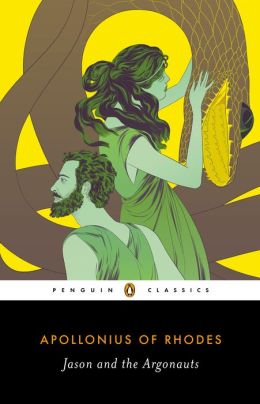Not much is known about Apollonios Rhodios (Apollonios of Rhodes); a poet and scholar who lived in Alexandria in the third century BCE, he likely served as the royally appointed head of the Alexandrian Library. Though he produced at least one other significant piece, only one of his poetical works, the Argonautika, has survived more or less intact as a manuscript copied and recopied for hundreds of years by hand. While clearly influenced by Homer, Apollonios also retains his own distinctive voice, and the Argonautika is a vivid, gorgeous tapestry of bad deeds, bad dudes, and one very special teenage girl.
Poet Aaron Poochigian’s recent verse translation (titled Jason and the Argonauts) for Penguin is an accessible, nimble, and often beautiful edition of Apollonios Rhodios’s epic; his footnotes are thorough but useful and concise, and his approach is respectful to the text but not reverent (he describes Rhodios’s voice as “endearing” as well as elastic, which it often is).
The bones of the Argonauts’ story are familiar to anyone with a passing knowledge of Greek myth: heroic Jason sets out on a quest for the mythical Golden Fleece with a greatest-hits assembly of Greek heroes (Orpheus and Heracles among them). The Fleece is in the possession of King Aetes, who understandably is less than interested in passing it on to Jason; the sympathetic goddess Hera enlists Eros’s aid in love-spelling Aetes’s daughter, teen witch Medea, who falls head over heels for Jason, betrays her cranky pa, and runs off with Jason and the Fleece, using her magic to see the heroes and their booty safely home. (Apollonios tastefully cuts his saga short before Medea’s murder of Jason’s second wife and her own children, the focus of Euripides’s play.)
Apollonios’s Jason is like a boy-band version of an expedition leader, notable more for his vanity than his competence (he sets out on his quest like “Apollo striding out of a fragrant temple and parading through holy Delos”). Even his own heroes don’t want him in charge, unanimously electing prevailing badass Heracles, who diplomatically suggests that since it’s Jason’s quest, Jason’s the boss—and then is obliged to repeatedly bail Jason out of hot water until Jason accidentally (or perhaps “accidentally”) leaves him marooned on an island. (“Jason is also a different kind of leader,” deadpans Benjamin Acosta-Hughes in his excellent and extremely useful introduction.) There’s plenty of room to spin the hero’s journey on its head, creating a Jason who defies macho chest-puffing and gives credit where credit is due: to Medea, the girl at the heart of his story, whose magic makes possible his quest’s final success.
But instead of drawing Jason as a Ryan Gosling for the ages, Apollonios presents him as a solid contender for greatest douche in the Western canon. Vain and preening heartthrob Jason sulks his way through the first book, carouses across various perilous isles, rapidly seduces and equally rapidly abandons the Lemnian queen Hipsipyle (“You must check your wild expectations where I’m concerned,” he snips when she—reasonably enough—asks him what she should do if she bears his child), and lets his underlings do battle on his behalf. Grumbling ensues. After Jason enlists the aid of the bewitched Medea, his buddies think even less of his leadership record: “If we entrust our homecoming to women,” gripes hero Argus, “our hopes are very pitiful indeed”; “On your way, then, boys,” huffs buff and bored Idas a few stanzas later. “Neglect the work of soldiers; go and woo fainthearted maidens over to our cause.” When Jason uses the magic potion smitten Medea gives him to help thwart her father, he performs Medea’s magic ritual in a fancy robe given him to Hipsipyle “as a memento of innumerable vehement caresses”—like wearing your ex’s bathrobe on a hot date with your new fiancée, it’s a fairly unclassy move.
And though the adventure is ostensibly Jason’s, it’s Apollonios’s Medea who’s vulnerable, human, and compelling; her lovestruck monologues rival equally doomed and desperate teen-heroine Juliet’s in their richness, passion, and heartbreaking beauty. The Argonautika doesn’t shy away from Medea’s willingness to get a little bloody in the service of true romance—she helps Jason dispatch her half-brother Aspyrtus like “a butcher slaughtering a bull”—but her anguish is palpable as she betrays her family and struggles poignantly with the emotions that threaten everything she’s ever known. Ovid’s Medea is a sinister, bloodthirsty witch; Euripides is more sympathetic but still paints her as something close to a monster; but Apollonios’s heroine is unmistakably a teenager, confused and passionate and at times almost uncannily modern, her voice reaching across the centuries in a cadence so familiar that her lines could have been written last week instead of two thousand years ago.
Poochigian’s lively—and lovely—translation will hopefully do the noble and just work of bringing Apollonius back to popular attention (Medea junkies can also check out Peter Green’s 1997 translation for the University of California Press). Apollonios’s Medea is worth the price of admission alone, but there’s plenty of epic here too for the quest-thirsty. Whatever your preference, the take-home lesson is clear: don’t mess with teenage girls.
Jason and the Argonauts is available now from Penguin Classics.
Sarah McCarry is the author of the novels All Our Pretty Songs, Dirty Wings, and About A Girl (which heavily features Medea) and the editor and publisher of the chapbook series Guillotine. Find her on twitter @therejectionist.










